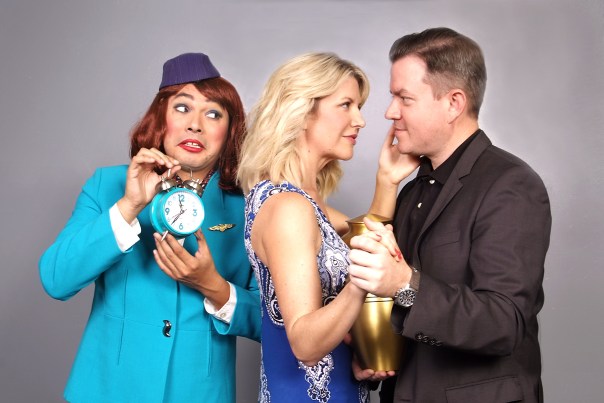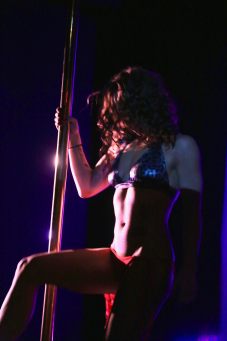 The road to creating a new play is often fraught with challenges, seemingly insurmountable obstacles, and, well, lots of drama – the offstage kind that none of us wants, but theater seems to attract.
The road to creating a new play is often fraught with challenges, seemingly insurmountable obstacles, and, well, lots of drama – the offstage kind that none of us wants, but theater seems to attract.
So it’s very nice to chat with Debbie Bolsky and Katherine James, a playwright and director team who seem to have found just the right mix of work and play while mounting Debbie’s Ashes to Ashes with The Athena Cats, premiering at The Odyssey Theatre December 9-January 14.
LA FPI: Ashes to Ashes is, in itself, a wild ride of a play – we follow the characters as they travel from country to country. What was the starting point for this play?
Debbie Bolsky: I’ve always said that when I die, I want to be cremated and have my ashes sprinkled in specific spots, so I came up with the idea of writing a romantic comedy about two people who can’t stand each other having to sprinkle their best friends’ ashes around the world.
Katherine James: My favorite thing about the path the characters take is that it is not a logical sequence on a map. In other words, if a travel agent mapped this as your journey you would assume that they were off of their meds. Rather, each country that is visited traces the journey of the heart – the steps in a relationship that test true love.

Debbie: Ashes to Ashes is a wild ride, fun and zany, but it’s also touching at times. The characters are an ex-couple, and in the play they are forced into situations where they face their biggest fears and have to depend upon the person they can’t stand the most to get them through. But they are also on the journey of discovering things they didn’t realize about each other, things they didn’t know about their deceased friends and finally things they didn’t admit about themselves.
LA FPI: And tell us a bit about where the two of you have traveled, in terms of this collaboration.
Katherine: I had the great pleasure of starting this journey with Debbie in an amazing workshop [Theatricum Botanicum Seedlings’ Dramaturgy Workshop, run by LA FPI co-founder Jennie Webb]. So as we workshopped it and rehearsed it we worked very hard on the emotional journey of the play, how it built, and how each step was a step of growth and intensity.
Debbie: Our collaborative process was phenomenal. Katherine came up with the idea of workshopping it for a week this past summer with actors (two of whom are still in the play) and that’s when the development started going at hyper speed. The actors took ownership of the characters. Collaborating with Katherine and the actors – Lena Bouton, Kevin Young and Michael Uribes – has helped me write a richer play and probably become a better writer.

Katherine: Collaboration is the name of the game for me. Also, to work with a collaborator like Debbie who is so trusting of this process is rare and welcome.
Debbie: I love working with Katherine! But for me, the biggest and most pleasant surprise is how well we all worked together – we are a team.
LA FPI: And of course we love how femme-centric this all is. The Athena Cats is a collective of Southern California female playwrights and directors; for this play you’ve got a woman playwright, director, producers…
Debbie: And a lot of the crew are female as well. A great thing about this experience is that there is very little ego involved. All of us working on this have the same goal, to bring Ashes to Ashes to the stage in the best way possible.
Katherine: I think that one of the big differences between men and women in management and leadership is that men tend to work on tasks from a top-down pyramid. Women create things in a circle with everyone in the circle having his/her say and all contributions are honored. It is amazing what a circle of big creative brains can accomplish when nurtured and encouraged to give their best to a project.
Debbie: The Athena Cats has been around for about two years now and this is our second production; in 2016 we produced Laurel Wetzork’s Blueprint for Paradise. [Laurel and Debbie are co-founders of The Athena Cats, and active LA FPI Instigators!] We also had a New Works Festival earlier in the year showcasing works written and directed by women. There are a lot of talented female writers and directors out there who are not getting an equal shot at getting their works seen. The whole idea of the Athena Cats is to get more works written and /or directed by women onto Southern California stages.
Katherine: Without The Athena Cats, I never would have been given the opportunity to direct this amazing romp. I don’t think that without LA FPI that I would have ever met Laurel and Debbie. Thank you, LA FPI, for being a cornerstone of my creative life!
LA FPI: Thank you for being part of an incredible creative team, putting women to work! To continue the love fest, let’s include the audience: When people come to see Ashes to Ashes, what do you want to share with them… and have them take away?
Debbie: Even though Ashes to Ashes starts out with a death, it is really about love, friendship and peace. We live in incredibly stressful times right now and I think laughter is sorely needed.
Katherine: The holiday season is a perfect time to laugh, sigh, fall in love all over again and go for a great ride. And in this dark time in our country’s history, where better to do this than in the theater?

The Athena Cats’ Ashes to Ashes by Debbie Bolsky, directed by Katherine James, opens as a visiting production at The Odyssey Theatre on December 9, 2017 and runs through January 14, 2018. For tickets and information visit www.AshesToAshesThePlay.com or call 323.960-.4443.













 Nevertheless, She Persisted is an
Nevertheless, She Persisted is an 









